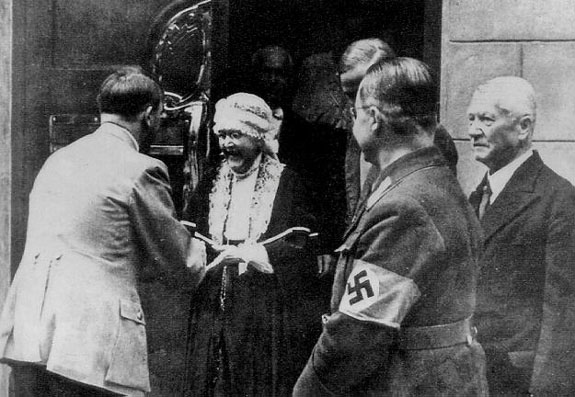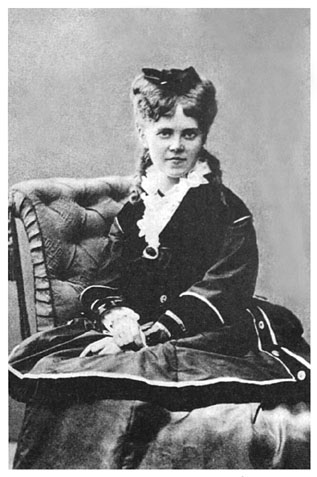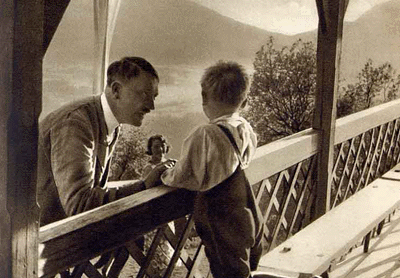January 14, 2005
Nietzsche and fascism
I'm still working on Sarah Kofman at the moment, in particular, her book Le Mepris des Juifs [Contempt for the Jews], in which she attempts to salvage Nietzsche from the interpretation of his work as proto-fascist, and, more importantly for Kofman, anti-Semitic. Kofman provides a 'survey' of Nietzsche's remarks about the Jews, and attempts to contextualise them in terms of the state of his identity, in relation to important figures in his life: his mother, his sister, and Wagner and Schopenhauer. She argues, roughly, that Nietzsche matured when he was able to renounce the anti-Semitic (amongst other things) attitudes of these 'forebears,' and finally came to identify himself as a Jew. As with many critics who rally to Nietzsche's defence against the nazi appropriation, Nietzsche's sister gets a bad rap in this book,  and it appears that Nietzsche might not have suffered the maligning that he did, had it not been for his sister's presiding over his literary estate, controlling how his books were published, and publicising Nietzsche's work as proto-fascist.
and it appears that Nietzsche might not have suffered the maligning that he did, had it not been for his sister's presiding over his literary estate, controlling how his books were published, and publicising Nietzsche's work as proto-fascist.
My question to Kofman is, what is her stake in cleansing Nietzsche of the taint of nazism? I read her interpretation of Nietzsche as very much implicated in her own feelings of ambivalence regarding her 'Jewishness'. In the light of her Rue Ordener, Rue Labat (discussed in a previous post). Rue Ordener is an autobiographical account of the trauma she suffered during WWII, after her father had been taken to Auschwitz and she was divided between her mother and a gentile 'lady' who wanted to Christianise her--Kofman perhaps identified not only with Nietzsche's philosophical perspective, but also with his deep ambivalence regarding the Jews. In this respect, her cleansing of Nietzsche of any ambiguity regarding his position on the Jews, is also a cleansing of herself... And Elisabeth Nietzsche plays the part of the dupe, or 'scapegoat,' upon whose back their collective sins are heaped on their day of atonement.
I've also been reading an interesting collection of essays dealing with the relation of Nietzsche to nazism.
Daniel Conway presents an interesting argument, that Nietzsche's comments on the Jews must be read in the context of his cultural/political project of imperialism: that he saw the Jews as his raw material--or a 'leavening agent'--that would infuse Europe with the right starter-culture that would lead to a more expansive, imperial attitude. According to Conway, Nietzsche did not see the Jews as good in themselves--in fact, he saw them as
ultimately responsible for such world calamities as the "slave revolt in morality," the birth of Christianity, the fall of the Roman Empire, the decline of the Renaissance, the rise of the Protestant Reformation, and the outbreak of the French revolution... He goes so far as to propose "Rome against Judea, Judea against Rome" as his preferred "symbol" for the historical struggles that have collectively defined the identity and destiny of European civilization.
According to Conway, Nietzsche saw the Jews as a strong people, but was deeply suspicious, even fearful of them, and kept to the stereotypes in his understanding of them. The Jews are useful to Nietzsche only in so far as they collaborate with his plan to reform Europe, and this would require their assimilation into the European populace, and ultimately their end, as a 'people.'
Robert C. Holub also presents an interesting reading of what he calls "the Elisabeth Legend," with reference to the "Nietzsche Legend" that Elisabeth cultivated around Nietzsche.  Holub's thesis is basically that, yes, Elisabeth did indulge in some small falsifications of Nietzsche's work--what amount to philological misdemeanors--but her influence on the Nazi appropriation of his works has been overstated, to the extent that Nietzschean scholars have conveniently been able to overlook the fascist potentiality of Nietzsche's texts altogether. Holub makes a case that the changes and omissions that Elisabeth made to letters and text do nothing to change the overall significance of his work: that her motive was most likely fairly domestic, that is, to exaggerate the closeness of their relationship, and to support her own animosities and prejudices regarding his other friends and acquaintances. As Holub points out, this is more of the order of exaggeration than falsification, as Nietzsche himself held these views at one time or another.
Holub's thesis is basically that, yes, Elisabeth did indulge in some small falsifications of Nietzsche's work--what amount to philological misdemeanors--but her influence on the Nazi appropriation of his works has been overstated, to the extent that Nietzschean scholars have conveniently been able to overlook the fascist potentiality of Nietzsche's texts altogether. Holub makes a case that the changes and omissions that Elisabeth made to letters and text do nothing to change the overall significance of his work: that her motive was most likely fairly domestic, that is, to exaggerate the closeness of their relationship, and to support her own animosities and prejudices regarding his other friends and acquaintances. As Holub points out, this is more of the order of exaggeration than falsification, as Nietzsche himself held these views at one time or another.
Although it may be grossly unfair to say that Nietzsche would have endorsed Hitler's platform--and indeed, he may even have vigorously opposed it in detail and spirit--it is important that Nietzscheans consider, and deal with, the elements of his text that can support a Nazi interpretation. It appears that a reluctance to get one's hands dirty drives the "Elisabeth legend", as well as the recuperation of Nietzsche as an advocate for the Jews... in a similar vein, what are we to make of images like this?:
Jo,
some quick comments. I reckon that I would dispute Conway's reading of Nietzsche as an imperialist. I would argue that Nietzsche rejected an expansive German nationalism (eg. that of Bismark) and saw himself as a good European.
In the post you write that Kofman's
"cleansing of Nietzsche of any ambiguity regarding his position on the Jews, is also a cleansing of herself..."
That 'cleansing' is the work of a therapeutic philosophy working on the poisons(eg., traumas) that make us sick. Or another description, Pierre Hadot's Philosophy as a Way of Life which characterises ancient philosophy as primarily practical in its aims, not theoretical. Wisdom was not identified with knowledge of the whole, but with happiness or well-being, which was to be attained by bringing about the proper internal ordering of the soul. Isn't Kofman engaged in those sort of practices?
An account of trauma:
"Trauma is a kind of wound. When we call an event traumatic, we are borrowing the word from the Greek where it refers to a piercing of the skin, a breaking of the bodily envelope. In Beyond the Pleasure Principle, Freud uses the term to describe a painful event not inflicted to the body but to the mind: the physical breaking of defenses becomes thus a psychic one. According to Cathy Caruth, trauma is always the story of a wound that cries out, that addresses us in the attempt to tell us of a reality that is not otherwise available. Trauma is an event which breaks through the protecting shield and overwhelms existing defenses against anxiety in a form which also provides confirmation of those deepest anxieties."
Kaufman's writing is a healing of her wounds, as a taking care of her wounded self.
Dunno about the Nietzsche as fascist stuff. Seems an abuse of philosophy to me by American liberals.You can be prejudiced against the Jews and not be a fascist. I'm not sure about the anti-Semitic stuff.
This is not to deny that Nietzsche's hands were not dirty. He was an arisocratic conservative who presumed that the many would slave in the factories to provide the economic surplus so that the noble free spirits could create a new culture and a new mode of valuation to overcome nihilism. That new mode of valuation was to affirm life not stunt or destroy it, as did Christianity.
Sure he detested democrats, liberals, feminists, socialists etc- he was a cultural warrior after all-- but that doesn't make him a fascist.
How come all this political stuff is returning. Is it an expression of the cultural wars in the American academy?
Just a side point Gary, are you implying that "a good European" cannot be an imperialist? Or in another words, are you implying here that imperialism is necessarily nationalistic (which would be a Leninist position I guess).
Regards
Ali
Ali,
as we know Europeans can be, and were, imperialists.I have understood Nietzsche's conception of himself as a good European in terms of today's movement of the union of European states.
By that I mean you can be a French women and a European without being an imperialist. European would be understood in terms of a particular kind of civilization.
On the other point. Does empire make use of nationality? Yes. The British did. So do the Americans today.
Is empire the same as nationalism? No. Enmpire has multiple modes of governance.
Posted by: Gary Sauer-Thompson on January 14, 2005 02:32 PMOkay, a number of things I guess...
1) Conway does differentiate between the kind of imperialism that Bismarck (and for that matter most of Europe) was engaged in at the time, and Nietzsche's stance as a 'good European,' but aligns Nietzsche with a more ancient (Roman) imperialism. According to Conway, Bismarckian imperialism demonstrated a degree of decadence: that Europe "was dying from the inside":
"According to Nietzsche... the frenzy of imperial expansion could never provide a viable substitute for the pulsating vitality of an integrated European culture. He thus exposed European imperialism as a quick, desperate fix for a horrible systemic affliction. The scramble for exotic colonies could serve at best to distract Europeans, and then only temporarily, from having lost their common center of gravity. Rather than signal the cultural superiority of the nations of Europe, imperial expansion had simply exported the self-contempt and dissolution that drove these nations apart from one another in the first place. Misery loves company, and the European imperial powers were bent on remaking the world in their own miserable image" (176)
In keeping with his own 'diagnosis' of European nihilism, and what he felt constituted strong health, Nietzsche's style of imperialism would be an outpouring of the grand style... a display of vigour rather than desperation, and his model for this was the Roman empire (which had been infected by Judaism, in the form of Christianity).
2) Kofman did see the pursuit of philosophy as continuous with the writing of her own life, which is why I'm examining her last writing/s in this manner, reading Le Mepris des Juifs alongside her autobiographical writings and her other work on Nietzsche written at the very end of her life, Explosions. I'm not sure that she saw philosophy as a mode of therapy, but she certainly engaged her philosophy with her life, and incorporated psychoanalysis with philosophy as well. BTW, the article you quote from is quite a nice one.
3)It's interesting that you say that the preoccupation with Nietzsche's nazi/anti-Semitic resonances is an American liberal one, because I got entirely the opposite impression at the Nietzsche society conference at the end of last year. Rather, what was consistently presented,
by a mostly Anglo-American crowd, was a sanitised, liberal version of Nietzsche, thoroughly de-nazified, after Walter Kaufmann. This is precisely what I'm trying to address, not by saying 'hey, Nietzsche was a nazi,' but by indicating that it would be better not to try to resolve the antogonisms within Nietzsche's work simply for the sake of better digestion--that it might be better to keep in mind, and keep having to negotiate, the things that make us uncomfortable about Nietzsche's philosophy.
Jo
Conroy's interpretation of good European on the model of ancient Rome is certainly at odds with my nice EU federal one ruled by the free spirits as commanders and legislators.
I accept the politics as the grand style based on a mode of valuation centred around the old republican virtues of vigor, courage and hardness etc that presuppose war is a necessity.
But imperial Rome meant Italy ruling Europe. Who rules Nietzsche's Europe? Germany? Or is Conway not suggesting that kind of imperialism.
Guess I will have to re-read Twilight of the Idols again.
yeah I have little time for the sanitised "liberal" Nietzsche as well. I was thinking of all the nonsense by American liberals against Heidegger, Schmitt, de Man etc (they were Nazis and their texts are fascist to the core etc), and wondering if all that 1930's/1940's fascist stuff re Nietzsche was being recycled.
Posted by: Gary Sauer-Thompson on January 14, 2005 03:41 PMI see. The contributers to the particular book that I was refering to (Nietzsche, Godfather of Fascism?) are predominantly Nietzscheans... Conway (who also wrote Nietzsche's Dangerous Game: Philosophy in the Twilight of the Idols and Nietzsche and the Political, and has a couple of other books on Nietzsche on contract at present)... and there are also contributions from Wolfgang Muller-Lauter, and Stanley Congold and Geoff Waite (who wrote the formidable work, Nietzsche's corps/e: aesthetics, politics, prophecy, or, The spectacular technoculture of everyday life)... Anyway, they've moved on somewhat from the gesture of complete dismissal to which you refer with respect to the early reception of Nietzsche, and the American attitude to Heidegger in general.
Something I find very interesting with respect to the discussion of Nietzsche's 'status' as proto-fascist is the extent of Jewish scholars that Nietzsche has attracted: Kaufmann, Kofman, Derrida, Yovel, Schrift, Shapiro, to name only a few. There's obviously something more to Nietzsche than simply a proto-fascist, and something that a lot of people on the left of the "political spectrum" want to salvage from his work. But the politically neutral Nietzsche that emerges from these accounts does not ring true either... and the big question is, to what extent are our politics 'tainted' when informed by Nietzsche's philosophy, with its background of 'aristocratic radicalism,' and his endorsement of slavery and empire. Anyway, I guess I'm not as resolved about that as some.
Posted by: jo faulkner on January 14, 2005 04:26 PMJo,
You could add the Adorno of Minima Moralia to the above list. There is a Jew on the left making creative use of Nietzsche's kind of cultural critique style of philosophizing about everyday life.
Adorno does not see Nietzsche as politically neutral. See Juliette or Enlightenment and Morality in Dialectic of Enlightenment for the "bad" Nietzsche.
You could look at those texts to see how Adorno is tainted by his texts being informed by Nietzsche's philosophy.
Remember your earlier remarks about Nietzsche's masks? Nietzsche wears many political masks. As a counter to the mask of the exceptional noble ones as birds of prey snacking on tender young lambs read 'Peoples and Fatherlands,'in Beyond Good and Evil (part eight) on the good Europeans, a Europe wanting to become one, a Europe of the future. It is about the formation of a great European culture.
I cannot see what is imperial about that.
Posted by: Gary Sauer-Thompson on January 14, 2005 06:14 PMGary,
I agree, all good points.
However I am not sure if European union is a non-imperialistic project. Transcending imperialism requires transcending capitalism and obviously European union is a project of strengthening capitalism and not of its weakening (or ultimate destruction).
Ali
Ali,
Sure.
The "European union is a project of strengthening capitalism and not of its weakening (or ultimate destruction)." It is strengthening in relation to, the American empire---as a challenging or a countervailing power.
But I'm not convinced that was Nietzsche's project. the references to Rome seem to be references in 'Peoples and Fatherlands' seem to be concerned with Wagner's Parisfal.
I do admit they are ambiguous as they refer to "Rome's faith without the text." (p.198)
Posted by: Gary Sauer-Thompson on January 15, 2005 07:54 PMWhat's the go here with all these comments? And no spam? Who knew?
Posted by: Scott on January 16, 2005 03:19 PMI appreciate the comments about Nietzche and his relationship to Nazi thought. However, If one really wants to see the roots of Nazi thought and action it is found in the philosophy of Kant. He is the arch architect of the thought process enacted by both Germany and Russia.
Posted by: Jeff Hoyal on January 27, 2005 06:41 PMI find such theories interesting and in my research find them also confusing. I'm only a sophmore in highschool but I find his life very interesting and am doing two papers on it. I would ask your help though in finding mis-quoted Nietzsche passages. I have heard and read how he was taken out of context and mis-quoted, but have been yet unable to find exact passages or in what Nazi publication or so on they were used. If you know any or can direct me to some, please e-mail at JKalalah@yahoo.com. Thank you.
Posted by: Josline Kalalah on April 22, 2005 04:42 AM